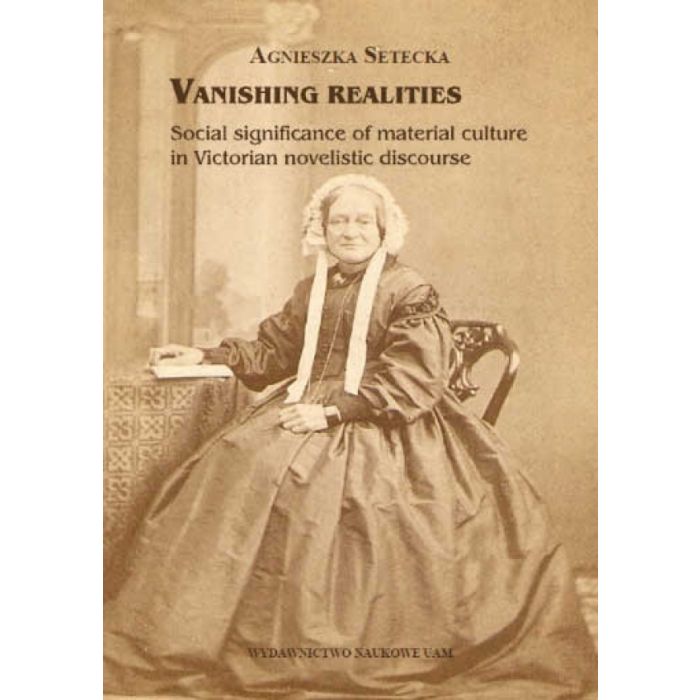Vanishing realities. Social significance of material culture in Victorian novelistic discourse
- Dostępność: dostępny
- ISBN: 978-83-232-2568-3
- Kategoria: OUTLET, Filologia Angielska, Kulturoznawstwo, Literaturoznawstwo, Socjologia
- Data wydania: 2013
Książka ukazuje realistyczną powieść wiktoriańską jako ważne źródło historyczne dotyczące życia codziennego dziewiętnastowiecznej Anglii. Koncentruje się ona na powieściowych przedstawieniach wybranych aspektów kultury materialnej, takich jak ubiór, dom i jego organizacja oraz czas wolny. Głównym założeniem książki jest przekonanie, poparte teoriami Nowego Historyzmu, że powieść nie jest zupełnie niezależną od świata zewnętrznego fikcją ani jego prostym odwzorowaniem, ale może być traktowana jako jeden z dyskursów, który kształtował percepcję rzeczywistości, a świat materialny przedstawiony w powieści staje się punktem stycznym dla dyskursów dotyczących klasy, moralności czy prywatności. Czytanie powieści jako źródła historycznego umożliwia zatem dogłębniejsze zrozumienie procesów kształtowania się kultury wiktoriańskiej, która jest rozumiana jako efekt ciągłych negocjacji czy tarć między ideologiami. W książce analizowane są powieści takich pisarzy jak Anthony Trollope, Wilkie Collins, Elizabeth Gaskell, George Eliot, Dinah Craik i innych, którzy swe powieści opublikowali od lat czterdziestych do lat siedemdziesiątych dziewiętnastego wieku.
The following study is concerned with the way novelistic representations of selected aspects of Victorian material culture contribute to a better understanding of the complexities of the Victorian past. The major claim made here is that the Victorian realist novel, for all its acknowledged fictionality, offers readers a glimpse into the processes of representation and production of culture, thus attaining the status of historical evidence. The first two chapters concentrate on the theoretical assumptions underlying this study, which incorporate historicists and culturalist views on literature as inseparable from its historical, sociological and political context, and on the concept of culture, understood as a broad category including the apparently most mundane and insignificant aspects of everyday existence, and its relation to ideology. The remaining chapters concentrate on selected aspects of Victorian culture as represented in the fiction of the period. Chapter Three analyses the novelistic representation of clothes and fashion, which constitute an important signifying practice in the Victorian period. The novelistic representation of dress becomes a nodal point where the discourses of femininity, class and morality meet to reveal the complex processes of construction of the feminine middle-class ideal. Chapter Four concentrates on representations of domesticity and of its relation to the public sphere, with particular attention to the way the border between the two realms was neither stable nor clear-cut, but required constant negotiations between conflicting forces. The analysis of the novels thus reveal the dynamics of the process of the construction of the distinction between the private
and the public, which demystifies the idea of home as the place of refuge from the outside world of strife and competition. Discussion on the interrelation of the private and the public is continued in Chapter Five, which concentrates on the representation of leisure as opposed to work in Victorian fiction, and the way they contribute to the construction of middle-class identity.
| Informacje szczegółowe | |
|---|---|
| Spis treści |
Pobierz plik

|
| Introduction |
Pobierz plik

|
|
|
|
| Wersja publikacji | drukowana |
| Format | 17,0 x 24,0 |
| Tytuł (EN) | Vanishing realities. Social significance o f material culture in Victorian novelistic discourse |
| Typ publikacji | Monografia |
| Wydanie | I |
| Seria | Filologia Angielska nr 40 |
| ISSN | 0554-8144 |
| ISBN | 978-83-232-2568-3 |
| Liczba stron | 342 |
| Liczba arkuszy wydawniczych | 21,00 |
| Rodzaj oprawy | miękka |
